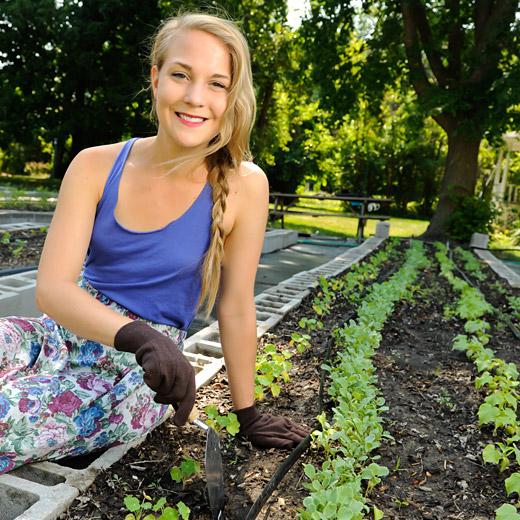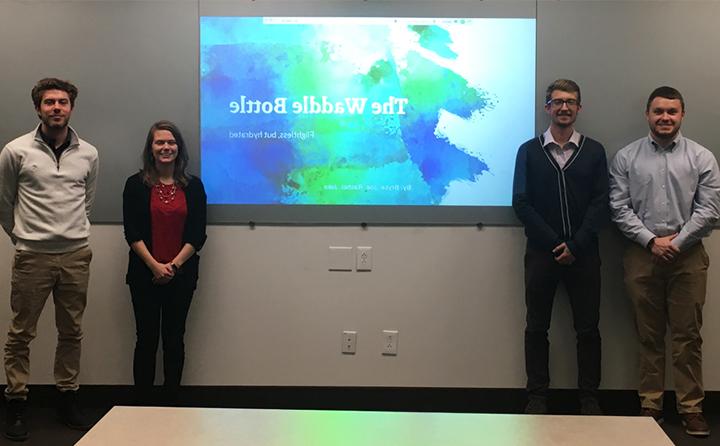
Co-Director, Sustainability Program
Ph.D., Ethics, University of Chicago
Interdisciplinary Program
Dr. David Krueger, (440) 826-5923, dkrueger@51rkb.com
Help create a more sustainable future for our planet and its people. Gain the skills to assist organizations and communities in achieving success through Triple Bottom Line thinking and operations.
Baldwin Wallace's sustainability major is a comprehensive program offering four concentrations - business, policy and ethics, quantitative science, and science - that enable you to customize your coursework to align with personal and professional interests.



As a Silver STARS*-rated AASHE** member institution, BW teaches students in the sustainability major in the problem-solving methodology of Triple Bottom Line thinking - people, planet and prosperity. This approach employs a transdisciplinary cost-benefit assessment, lifecycle analysis and nested systems mode of evaluating the environmental, social and economic consequences of the choices people make individually and collectively to achieve the greatest benefit at the least cost to future generations.
*Sustainability Tracking Assessment Rating System
**Association for the Advancement of Sustainability in Higher Education
Sustainability focuses on developing solutions that enable communities and organizations to be socially responsible, environmentally friendly and economically savvy innovators. Environmental science focuses on the application of biological, chemical and physical principles to the study of the physical environment and the solution of environmental problems.
Baldwin Wallace's sustainability program provides a direct pathway to a rewarding career. Sustainability majors may choose one of four concentrations:
All four concentrations in the sustainability degree program begin with similar foundational coursework and interdisciplinary options. Upper-level coursework is geared towards deepening the knowledge base of students in each of the four concentrations in preparation for a career.
In your junior year, you will put your inventiveness to work proposing bioinspired and biomimetic products via a biomimicry course that teams you with engineering and business students.
Senior year includes a capstone course that will provide you with a team-based learning experience working on projects emphasizing the practical application of sustainability methods.
View the University Catalog for course descriptions, requirements for the major and additional information.
BW's sustainability major prepares students to:
In addition to BW's major in sustainability, there are other programs that can enhance your studies.
Faculty mentoring and real-world learning experiences offer outstanding opportunities both inside and outside the classroom.
BW sustainability majors have secured internships at many corporations and nonprofits such as Goodyear, Oatey, Wendel Architects and Engineers, the Flying Horse Farms, West Creek Conservancy, City Ashtabula, Lake Erie Energy Development Corporation (LEEDCo), Cleveland's Office of Sustainability, the Metroparks and the Cleveland Port Authority.
Currently, more than 25 BW faculty are engaged in sustainability-related research. The sustainability program has secured more than $500,000 in funding for various projects, including from the US Environmental Protection Agency (EPA) to help fight food waste and insecurity through smartphone technology.
 Over the past three years, sustainability majors have been selected to participate in the BW Summer Scholars program to work on food insecurity, stormwater runoff and air quality mapping. Several students have won prizes in campus competitions, including Jonathan Schroeder '23 (pictured to the right), who won $1,000 in BW's 2021 IdeaLabs Competition for the invention of a solar powered hydroponic tower called the Branch Light™ that he and teammates developed for a class, Biomimicry - Naturally Inspired Innovation.
Over the past three years, sustainability majors have been selected to participate in the BW Summer Scholars program to work on food insecurity, stormwater runoff and air quality mapping. Several students have won prizes in campus competitions, including Jonathan Schroeder '23 (pictured to the right), who won $1,000 in BW's 2021 IdeaLabs Competition for the invention of a solar powered hydroponic tower called the Branch Light™ that he and teammates developed for a class, Biomimicry - Naturally Inspired Innovation.
Other student teams from the course won cash prizes in 2018-20 in the BW Start Something competition for a penguin-inspired water bottle, shark gill-inspired drain filter and turtle shell-inspired iPhone case. In addition, another student received the Women for BW award for a guerilla gardening hydroponic tower concept.
Biomimicry Club facilitates the expansion of knowledge and practice of biomimicry through discussion, community service and education. Pictured below, the Biomimicry Club's Team Waddle Bottle took the first-place prize of $300 in the social enterprise category of the 2018 Start Something BW competition. From left to right, Jake Davis, Bryce Posner, Rachel Neuerer and Joe Rini were inspired by penguin blubber to design a lightweight, flexible, insulated water bottle suited to outdoor enthusiasts, military personnel and others working in extreme weather conditions.

Students for Environmental Awareness work on sustainability events on and off campus. The impact of the club can be seen across the BW campus, including the EZH20 water stations, which have taken over a million plastic bottles out of circulation.
Student Tended Natural Garden (STNG) sponsors a community garden through which it educates the campus and surrounding community about the importance of composting, sustainable initiatives and local food.

BW launched Ohio's first undergraduate major in sustainability in 2008 and has earned the prestigious STARS Silver rating from the international Association for the Advancement of Sustainability in Higher Education. BW is ranked in 2021 Sierra Club Cool School and has been designated a Tree Campus USA® by the Arbor Day Foundation. We were ranked 88 of 420 Green Colleges and Universities in 2021 by the Princeton Review.
Baldwin Wallace is dedicated to sustainability as a signatory to the Talloires Declaration. Though too numerous to name, some initiatives include:


David Krueger
Co-Director, Sustainability Program
Professor
Ph.D., University of Chicago
Kelly Coble
Chair, Philosophy Department
Professor of Philosophy
Ph.D. in Philosophy, DePaul University
Jill Stephens Fleisher
Associate Dean, School of Social Sciences
Professor of Sociology
Ph.D., Purdue University
Helen Muga
Associate Professor of Engineering
Ph.D., Michigan Technology University
Lisa Ponton
Associate Professor
Ph.D., Iowa State University
Ellen Posman
Professor of Religion
Ph.D., University of California, Santa Barbara
Annette Trierweiller
Assistant Professor of Environmental Science
Ph.D., Princeton University
Charles Fairchild, Director of Dining Services
Randy Hudak, Director, Buildings and Grounds
Dr. David Krueger, Committee Chair, Co-Director of Sustainability Program
Dr. Michael Melampy, Professor Emeritus, Biology and Geology
Professor Paul Penko, Physics
Dr. Christy Walkuski, Director of Community Engagement and Service Learning
Steve Crone, Director, Aramark Custodial Services